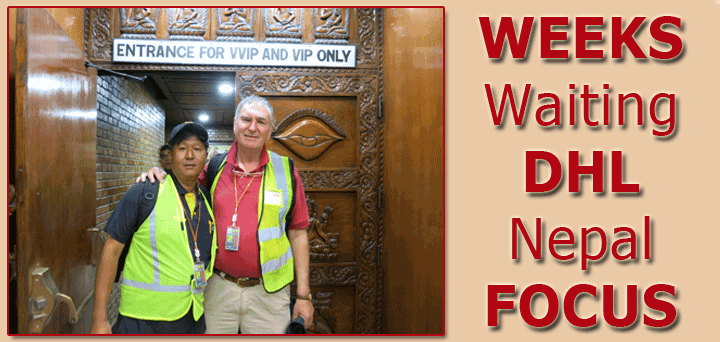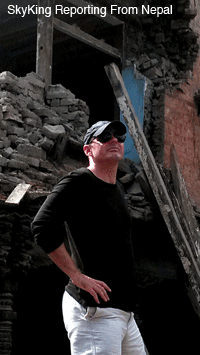
DHL’s Disaster
Response Team has been the most prominent industry presence on the ground
in Nepal, but team leader Chris Weeks would like to do more.
A team of DRT volunteers consisting of DHL
employees from countries including Bahrain, Belgium, Dubai, India, Malaysia,
and Singapore arrived in Kathmandu two days after the first huge quake
struck this mountainous country on April 25, 2015.
Supported by Gagan Mukhia, country manager
of DHL Express Nepal (pictured above with Chris Weeks), the team
has since been working with the United Nations Office for the Coordination
of Humanitarian Affairs by handling incoming cargo on the apron from where
it is loaded onto trucks and taken to a nearby staging area for onward
distribution.
 But Weeks, DHL director for Humanitarian
Affairs, said he was frustrated that DRT had been operating with substandard
equipment. On arrival KTM was short not only of dollies, but also of basic
handling equipment, especially fork lift trucks. DHL has been operating
with what it could borrow or fix to handle incoming freight, often while
passengers are directed straight through its section of the apron, which
is shared with the U.S. Air Force.
But Weeks, DHL director for Humanitarian
Affairs, said he was frustrated that DRT had been operating with substandard
equipment. On arrival KTM was short not only of dollies, but also of basic
handling equipment, especially fork lift trucks. DHL has been operating
with what it could borrow or fix to handle incoming freight, often while
passengers are directed straight through its section of the apron, which
is shared with the U.S. Air Force.
In the future he would like DHL to arrive
with its own equipment. “Ten, even five years ago you could get
away with a few forklifts and army of laborers to move things, but now
you can’t because everything is on aircraft pallets because it’s
much more efficient to move things on big commercial cargo jets. At 100
tonnes at a time, agencies want to bring in shelter equipment in bulk
so it’s cheaper for them. But the downside is it comes on these
massive aircraft pallets that need to be moved with heavy equipment and
if that’s not there, then you’re in trouble.”
Weeks is pushing to secure DHL funds so
DRT has mobile kits in place that are able to start up an operation the
minute they hit the ground. At an estimated cost of around Euro 300-400,000,
he would like DHL to invest in five forklift trucks and five dollies and
one slave pallet.
“It’s about time we got around
to doing that so we’re not reliant on other people,” he said.
“At the moment, we’re relying on governments to send us the
right equipment in, but they don’t always get it right or on time.”
“I am going to work on a system where
we (the DRT) buy proper spec FLTs, which we will use and maintain at our
SIN Hub. When we need them for training or deployment we will take them
out and the hub can rent replacements. We'll also use contacts with the
Singapore Defense Force to arrange an agreement for C 130 transport to
wherever we need to go.”
Over to you, Frank Appel.
SkyKing
Editor's Notes: SkyKing is working with a charity to raise USD $50,000
for Nepal humanitarian efforts. This will be enough to feed and provide
shelter through the monsoon season for almost 600 families in Sindhupalchowk,
many of whom have been left homeless.
The devastation to the morale of Nepalese citizens is difficult to quantify,
but after having been struck not once, but twice, it can only be assumed
the citizenry is in the direst of straits. If you would like to donate,
please click here. |





